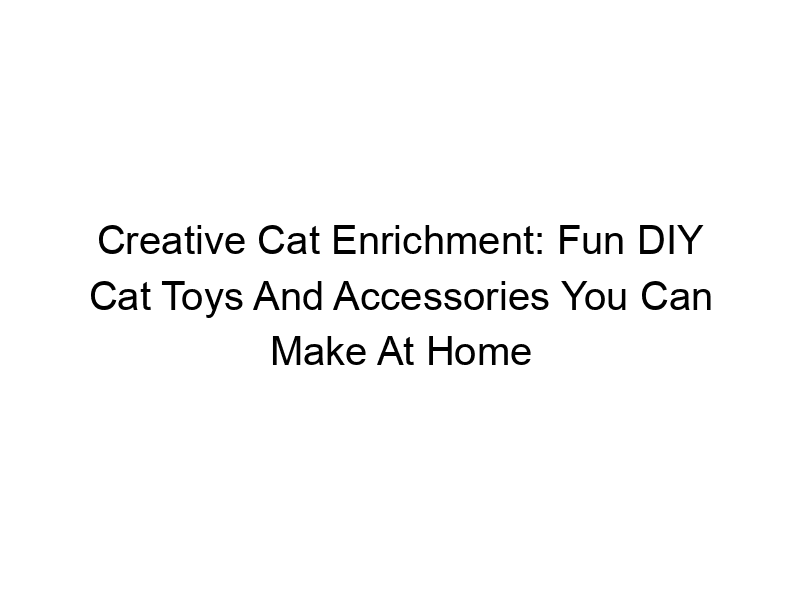Creating a stimulating and engaging environment for your feline friend is crucial for their physical and mental well-being. This guide delves into the exciting world of Fun DIY Cat Toys and Accessories You Can Make at Home, offering a comprehensive look at crafting enjoyable and enriching playthings for your cat. We’ll cover a range of projects, from simple to more advanced, using readily available materials. You’ll learn how to make toys that cater to your cat’s natural instincts, stimulate their hunting skills, and provide hours of entertainment. Get ready to unleash your creativity and build a happy, playful home for your beloved kitty!
Before diving into DIY projects, it’s crucial to understand what motivates your cat to play. Cats are natural predators, and their play often mimics hunting behaviors.
Toys that mimic prey – small, moving objects – are usually the most engaging. Understanding your cat’s preferences – whether they prefer chasing, batting, or pouncing – will help you choose the right DIY projects.
Types of Cat Play
- Stalking and Ambushing: Cats love toys that allow them to stalk and then ambush their “prey.” Think long, string-like toys or toys hidden under furniture.
- Chasing and Pouncing: Fast-moving toys like feather wands or laser pointers stimulate their natural hunting instincts.
- Wrestling and Battling: Toys that can be manipulated and wrestled with, such as crinkle balls or stuffed mice, satisfy their need for physical activity.
DIY Cat Toys: Simple and Easy Projects
Let’s start with some simple projects perfect for beginners. These require minimal materials and crafting skills, yet offer significant enrichment for your cat.
The Cardboard Box Castle
A simple cardboard box can become a magnificent castle in your cat’s eyes. Cut out windows and doors of various sizes to create interesting entry points and hiding places. Add a scratching post inside for added enrichment.
Crinkle Ball Delight
Use plastic shopping bags or crinkling paper to create engaging balls. Simply crumple the material tightly and secure it with a rubber band or string. The crinkling sound will pique your cat’s interest.
DIY Cat Toys: Intermediate Level
Once you’ve mastered the basics, let’s explore some more elaborate DIY projects.
The Sock Mouse
Old socks can be transformed into adorable mice! Stuff an old sock with cotton or catnip, and tie it off at the end. Add embellishments like buttons or yarn for extra appeal. Ensure all embellishments are securely attached to prevent ingestion.
DIY Catnip Toys
Catnip is a powerful attractant for many cats. Sew small fabric pouches filled with catnip, creating durable and engaging toys. You can even use old t-shirts or fabric scraps for a sustainable option.
DIY Cat Accessories: Enhancing Your Cat’s Environment
Beyond toys, you can create accessories to enhance your cat’s environment and improve their comfort.
A Cozy Cat Bed
Create a warm and snug haven for your cat using old sweaters, blankets, or towels. Sew the pieces together, adding padding for extra comfort. Ensure it’s a size that suits your cat.
Vertical Scratching Post
Cats love to scratch. Create a vertical scratching post using a sturdy piece of wood or cardboard, wrapped in sisal rope or carpet scraps. This will protect your furniture from damage while providing a satisfying scratching surface for your cat.
DIY Cat Toys: Advanced Projects
For the more experienced crafter, there are a range of advanced projects you can tackle.
Interactive Puzzle Feeder
Challenge your cat’s intelligence by creating a puzzle feeder. Use PVC pipes, cardboard boxes, or other materials to design a container that requires some effort for your cat to access the treats inside. This promotes mental stimulation and prevents boredom.
Tunnel Toy
Cats love exploring enclosed spaces. Create a cat tunnel using fabric, cardboard boxes, or PVC pipes. Add different textures and materials for enhanced sensory stimulation.
Using Recycled Materials for Cat Toys
Sustainability is key! Many DIY cat toy projects can be made from recycled materials, reducing waste and saving money.
Repurposing Cardboard Boxes
Cardboard boxes are endlessly versatile. Cut openings, create tunnels, or simply leave them as is for your cat’s amusement.
Using Old Clothes
Old clothes, particularly socks and t-shirts, can be easily transformed into cat toys or bedding.
Repurposing Toilet Paper Rolls
Empty toilet paper rolls can be turned into fun rolling toys. Simply cover them in yarn, fabric, or paper to add texture and interest.
Safety Considerations When Making DIY Cat Toys
Safety is paramount when crafting toys for your cat. Ensure all materials are non-toxic and securely fastened. Avoid using small pieces that could be swallowed, and supervise your cat during playtime.
Choosing Safe Materials
Opt for natural and non-toxic materials like cotton, wool, or sisal. Avoid materials containing chemicals or small parts that could pose a choking hazard.
Securely Attaching Parts
Ensure all components are securely attached to prevent your cat from ingesting them. Use strong stitching, glue, or knots.
Comparing DIY Toys to Commercially Available Options
DIY toys offer several advantages over commercially produced options, including cost-effectiveness and customization. However, commercially available toys often undergo rigorous safety testing.
Cost Comparison
DIY toys are significantly cheaper than most store-bought toys.
Customization Options
DIY allows you to tailor toys to your cat’s specific preferences and play styles.
Safety Considerations
While DIY toys can be safe, careful planning and material selection are crucial to avoid potential hazards.
The Benefits of DIY Cat Enrichment
Enriching your cat’s environment with DIY toys and accessories offers numerous benefits, promoting physical and mental well-being.
Physical Benefits
Encourages exercise and prevents obesity.
Mental Benefits
Reduces boredom and stress, promotes mental stimulation.
Bonding Opportunities
Spending time creating and playing with your cat strengthens your bond.
Troubleshooting Common Issues
Sometimes DIY projects don’t go as planned. Here are some troubleshooting tips.
Toy Durability
If a toy falls apart quickly, consider using more durable materials or stronger construction techniques.
Cat Disinterest
Not all cats react equally to toys. Experiment with different textures, materials, and types of play to find what your cat enjoys.
Frequently Asked Questions
What materials are best for making DIY cat toys?
Durable, non-toxic materials are best, such as cotton, wool, sisal rope, and cardboard. Avoid using small parts that could pose a choking hazard, and always supervise your cat during play.
How can I make sure my DIY cat toys are safe?
Carefully inspect all materials to ensure they’re non-toxic. Securely attach all components to prevent your cat from ingesting them. Avoid using any materials that could easily unravel or become a choking hazard.
What if my cat doesn’t like my DIY toys?
Not every cat will enjoy the same toy. Experiment with different designs, textures, and materials. Try adding catnip to entice your feline friend to engage with the toy. If your cat still doesn’t show interest, don’t be discouraged; it’s simply a matter of finding the perfect toy for their unique preferences.
How often should I replace DIY cat toys?
Replace toys when they become damaged or soiled. Regularly check for wear and tear, and discard any parts that show signs of damage to prevent potential hazards.
Final Thoughts
Creating Fun DIY Cat Toys and Accessories You Can Make at Home is a rewarding experience that strengthens your bond with your feline companion while providing crucial enrichment. By understanding your cat’s play instincts and choosing appropriate materials, you can design toys that cater to their unique needs and preferences. Remember to prioritize safety and always supervise playtime. Through careful planning and creativity, you can transform ordinary household items into extraordinary sources of fun and entertainment for your beloved cat. Start crafting today and watch your cat enjoy their new homemade treasures!




